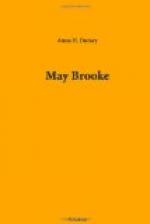“Pained me, dear Helen; but you will do better now. You feel, I am very sure, that a life of prevarication and indifference does not answer for a Catholic; and now there will be nothing to hinder you.”
“Perhaps so, dear May. I really wish to do right—but what, in the name of mercy, is that noise!” cried Helen, starting up.
“It is Uncle Stillinghast coming in. He is beating the snow from his feet,” said May, lighting the candles. By this time Mr. Stillinghast had thrown off his wrappings, hung up his hat, and come in. He was evidently in no amiable mood, and to the greetings of his nieces condescended no reply.
“It is colder this evening, Sir, is it not?” said May, flitting around the tea-table.
“Yes.”
“Shall I get your tea now, uncle?”
“Yes.”
“Here it is, sir; it is very nice and hot; every thing is ready. Come, Helen,” said May, placing the chairs. They took their seats in silence.
“What’s your name?” Mr. Stillinghast said abruptly, turning to Helen.
“Helen.”
“Can you make bread?”
“No, sir,” replied Helen, in trembling tones.
“Learn, d’ye hear?”
“Yes, sir.”
“Can you sweep—make a shirt—wash—iron?” he burst out.
“No, sir,” she said, trembling.
“What are you good for, then?” he inquired, sternly.
“I don’t know, sir; I can play on the harp,” faltered Helen.
“Play the devil! You are a pretty, curly wax doll—good for nothing, and cumbering the very earth that you live on.”
Helen said nothing, but tears rolled over her cheeks.
“But I will have no idlers about me. You shall learn to be useful and industrious. D’ye understand?”
“I will try, sir.”
“Very well. And now, miss, what were you doing parading about with old Copeland down town?” he said, turning suddenly to May; “a man I detest with all my soul.”
“I do not know any individual of that name, sir. I missed my way this morning, and inquired of an old gentleman who was passing the address of a person I had business with. Then he offered to show me, as he was going past the place,” said May, lifting her clear, truthful eyes, to his face.
“And what business, pray, led you to a part of the city so little frequented by the respectable of your sex?”
“If you will excuse me, sir, I would prefer not telling you,” she said, gently.
“I insist on knowing,” he exclaimed, angrily.
“You will excuse me, sir, when I tell you that it was quite a little affair of my own,” replied May, in a low voice.
“Very well, madam!” said Mr. Stillinghast, bowing with a sneer; “but depend on’t I shall sift this matter—it shall not rest here.”
“I am grieved, dear uncle, to have offended you,” began May.
“Be silent! You are full of popish tricks; I suppose you were engaged in one this morning. Go, answer the bell!” Glad to escape, May stepped the hall to open the door, and ushered in a tall, fine-looking man, who said he had business with Mr. Stillinghast. He bowed with a well-bred air to May and Helen, then to Mr. Stillinghast, who invited him to be seated.




